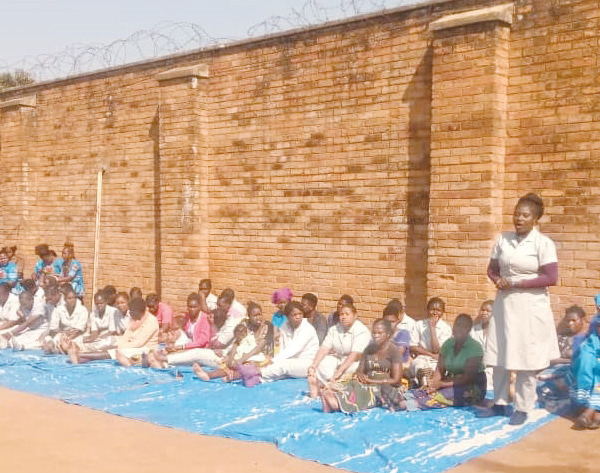Babies behind barbed wire
It is Tuesday morning and four innocent babies can be seen in the hands of women inmates at Blantyre Prison.
The babies behind the bars are spotted playing, sleeping or breastfeeding in the female section.

They committed no offence, but their mothers may have.
But here they are, spending days and nights in the tall barbed-wire fence not suitable for early childhood development.
These confinements rob them of the vital years when every child deserves a quality start in life.
The irreparable damage includes compromised nutrition, education, healthcare and welfare.
On this day, women police officers and policemen’s wives led by Assistant Commissioner of Police Rhoda Luhanga, from B Company in Kanjedza, are visiting the female section to cheer the inmates.
“It’s not by choice that all these people find themselves in prisons. Some are here by mistake. Look, we even have innocent children in here,” says Luhanga after donating assorted items, including foodstuffs, soap and clothes.
Every day, these police officers arrest and take suspected offenders to court where those found guilty are sent to prison.
The police women’s welfare committee members know what it takes to raise a child.
“This is a tougher environment altogether, so we have to support and encourage them,” Luhanga adds.
Murder suspect Fanny Black, from Bangwe Township in Blantyre, is confined to the prison alongside her child. She appeals to authorities to swiftly take the inmates with babies to court.
“Allow us to face justice,” she implores. “A day here is enough punishment for one to transform; you don’t even need a month. Those handling my case should take me to court to answer this charge.”
Black last appeared in court in April this year, but says she has “not heard anything” since the High Court judge asked the State to submit a report about her living conditions as a mother confined with a baby.
“My child was only two months old when I came here on remand. Now he is a year and seven months old,” says the woman suspected to have murdered the child’s father.
To her, prison life is particularly tough for women with children.
She laments: “Sometimes we sleep in overcrowded cells, which is challenging for us with babies.
“We share our meagre meals with the babies though it is not appropriate for them. When disease outbreaks erupt, our babies aren’t safe.”
There are 15 babies in the country’s overcrowded prisons, according to Malawi Prisons Service national spokesperson Chimwemwe Shaba.
Besides the Blantyre four, they include two babies at Mzuzu Prison, five at Kachere in Lilongwe, two at Ntcheu and one each at Chikwawa and Nsanje.
“Some babies are born in prisons,” he says.
The law allows lactating mothers to take breastfeeding children to prison until they can be weaned into the care of relatives or
social welfare.
However, Centre for Human Rights Education, Advice and Assistance (Chreaa) executive director Victor Mhango says the harsh reality is that the children remain in prison with their mothers even after being weaned.
He explains: “The prison system appears to have no deliberate system for such children.
“The courts should first consider the best interests of a child before incarcerating primary caregivers. In fact, there is a High Court decision that requires detention of mothers as a last resort where the mother has to take a child in prison.”
The Legal Affairs Committee of Parliament watches over governance institutions such as Malawi Human Rights Commission and the Prison Inspectorate.
Its chairperson Albert Mbawala says the parliamentary committee is concerned about the rights of the children being infringed upon.
The lawmaker states: “As a country, we need to relook at our legal framework and possibly revise some laws to ensure the rights of these children are protected.
“The Prisons Directorate and the Malawi Law Commission should consider reviewing existing laws to safeguard the rights of these children.”
Chreaa, Irish Rule of Law International, Reprieve and the World Coalition against the Death Penalty have reported the plight of children being raised in prisons to the United Nations (UN) Committee on Economic, Social and Cultural Rights.
The report submitted to the committee’s 72nd working group pre-session slated for next month affirms that the best interests of the child are paramount.
However, it laments that the current prison conditions severely impact children’s growth and development.
The campaigners fault the country’s prison system for failing to provide adequate food and nutrition, proper medication, sanitation and hygiene for detainees.
The prisons do not offer “adequate areas where babies and young children may safely play or exercise and access to learning and developmental toys are non-existent”, they report.
Their submission reads in part: “The mental health development of young children and babies is impacted severely by the traumatic surroundings and experiences that they witness in prisons.”






One Comment